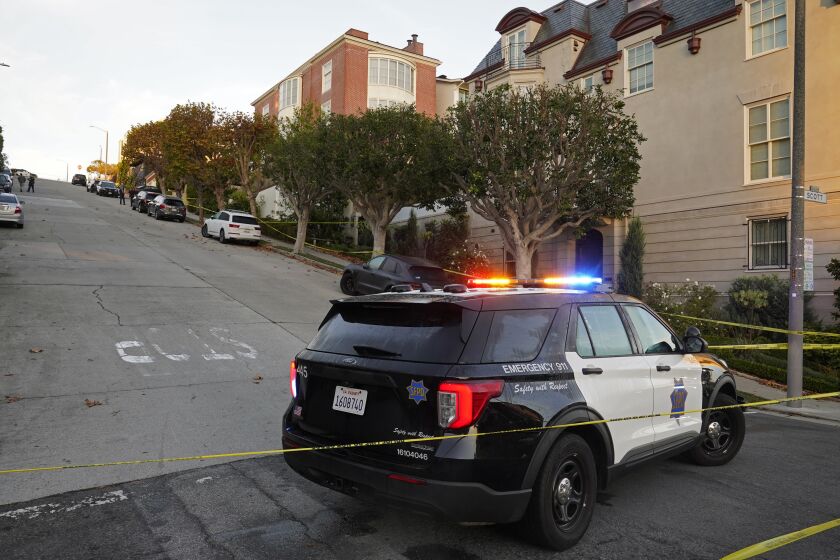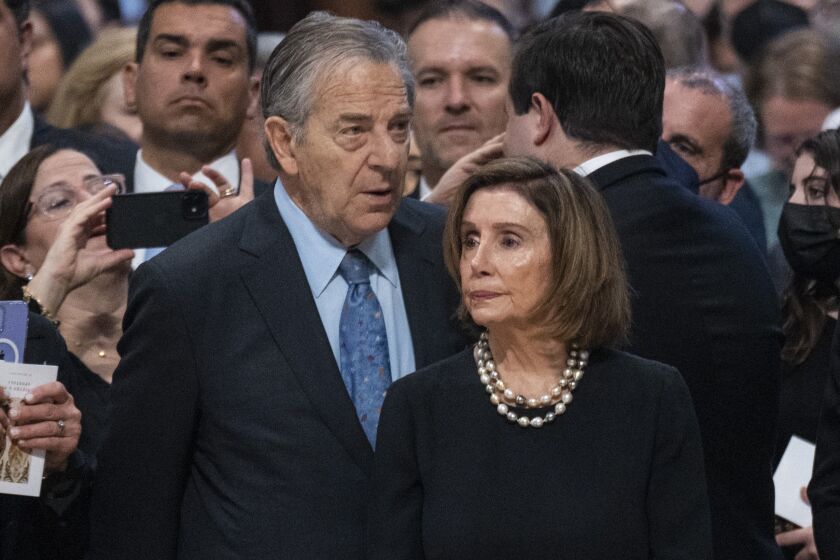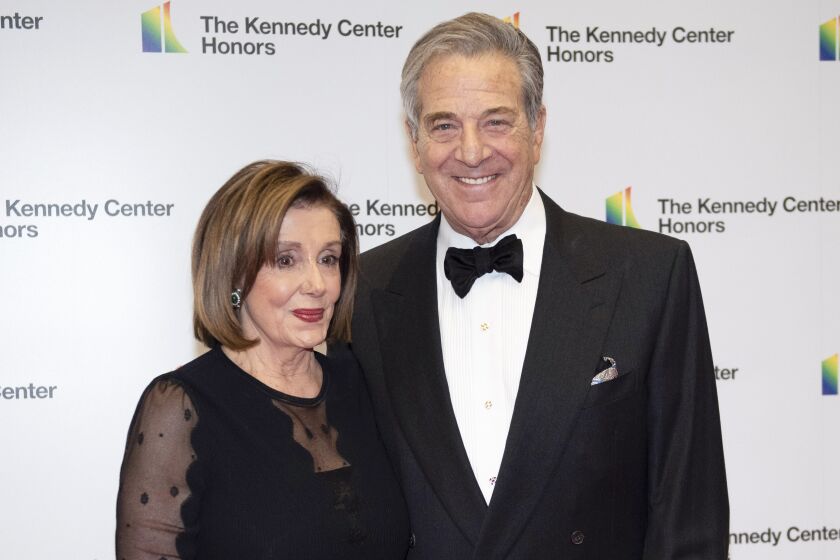Elon Musk spreads unfounded conspiracy theory about Paul Pelosi attack on Twitter

Days after taking control of Twitter, Elon Musk on Sunday posted and later deleted an unfounded conspiracy theory about the attack on Paul Pelosi, the husband of House Speaker Nancy Pelosi.
On Saturday, Hillary Clinton tweeted a Los Angeles Times story profiling the suspect, who is accused of breaking into the Pelosis’ home and attacking Paul Pelosi with a hammer, and his far-right extremist views.
“The Republican Party and its mouthpieces now regularly spread hate and deranged conspiracy theories,” she wrote. “It is shocking, but not surprising, that violence is the result. As citizens, we must hold them accountable for their words and the actions that follow.”
In response, Musk tweeted Sunday morning to his 112 million followers that “there is a tiny possibility there might be more to this story than meets the eye” and posted a link to an unfounded story offering a conspiracy theory about the attack. The story was posted in the Santa Monica Observer, a publication known for spreading misinformation.
Musk’s tweet was deleted hours later, after receiving tens of thousands of retweets and likes. The tweet came hours before the San Francisco district attorney confirmed Sunday afternoon that the suspect, David DePape, was looking for the House speaker when he forced his way into the Pelosis’ home.
The Times, in a 2021 editorial, noted that the Observer “is notorious for publishing false news. In 2016, for example, it claimed that Hillary Clinton had died and that a body double had been sent to debate Donald Trump. Months later it reported, incorrectly, that Trump had appointed Kanye West to a high-level position in the Interior Department. Last year, it reported falsely that sunlight could be a remedy for COVID-19 sufferers and that Bill Gates, a major funder of vaccine research, had been responsible for a polio epidemic.”
The Observer website “fails to adhere to several basic journalistic standards,” according to a report by NewsGuard, a company that rates news sites to separate reliable sources of journalism from purveyors of false or misleading information.
Authorities said that David DePape, 42, attacked Paul Pelosi with a hammer inside the Pelosis’ San Francisco home early Friday. A source who was briefed on the attack said the assailant repeatedly shouted, “Where is Nancy?” Police arrived on the scene after being alerted by a call from Paul Pelosi, who managed to conceal the call from his attacker.
Nancy Pelosi (D-San Francisco) was in Washington at the time but has since returned to California to be with her husband, according to news reports.
Police have not offered a motive for the attack.
Paul Pelosi, 82, is recovering from surgery at Zuckerberg San Francisco General Hospital “to repair a skull fracture and serious injuries to his right arm and hands,” said Drew Hammill, a spokesperson for Nancy Pelosi’s office. He is expected to recover fully.
San Francisco Police Sgt. Adam Lobsinger, a department spokesman, said Sunday that Paul Pelosi and DePape were the only two people in the house during the attack.
“Mr. Pelosi does not know Mr. DePape,” Lobsinger said, emphasizing that the suspect was a stranger to Pelosi.
“We aren’t confirming any evidence that may or may not have been located at the scene,” Lobsinger added.
DePape was booked Friday afternoon on suspicion of attempted murder, first-degree burglary, assault with a deadly weapon, threatening a family member of a public official, elder abuse, battery with serious bodily injury, dissuading a witness and injuring a wireless device.
A Times review of his online accounts show that DePape had been drifting further into the world of far-right conspiracies, antisemitism and hate.
In a personal blog that DePape maintained, posts include such topics as “Manipulation of History,” “Holohoax” and “It’s OK to be white.” He mentioned 4chan, a favorite message board of the far right. He posted videos about conspiracies involving COVID-19 vaccines and the war in Ukraine being a ploy for Jewish people to buy land.
DePape’s screeds included posts about QAnon, an unfounded theory that former President Trump is at war with a cabal of Satan-worshipping elites who run a child sex ring and control the world. In an Aug. 23 entry titled “Q,” DePape wrote: “Either Q is Trump himself or Q is the deepstate moles within Trumps inner circle.”
On Saturday, Nancy Pelosi told her congressional colleagues that she and her family were “heartbroken and traumatized” by Friday’s events.
“Our children, our grandchildren and I are heartbroken and traumatized by the life-threatening attack on our Pop,” Pelosi said in the statement, which was addressed to members of the U.S. House of Representatives. “We are grateful for the quick response of law enforcement and emergency services, and for the lifesaving medical care he is receiving.”
Musk completed his $44-billion takeover of Twitter last week after a protracted legal battle and months of uncertainty.
After backing out of an initial deal to buy the company earlier this year, Musk announced this month that he was resuming the acquisition, stalling a lawsuit against him in Delaware. A judge had ordered him to complete the deal by Friday.
The deal means Twitter will become a private company that everyday investors will no longer be able to buy shares in.
Major personnel shake-ups are widely expected, and Musk ousted three top Twitter executives last week, according to two people familiar with the deal. But the tech guru and self-proclaimed “Chief Twit” has otherwise made contradictory statements about the future of the company — and shared few concrete plans for how he will run it.
That has left Twitter’s users, advertisers and employees to parse his every move in an effort to guess where he might take the company. Many are looking to see if he will welcome back a number of influential conservative figures banned for violating Twitter’s rules.
In response to Musk’s tweet linking to the unfounded post about the Paul Pelosi attack, state Sen. Scott Wiener (D-San Francisco) tweeted: “It only took 72 hours for Elon Musk, as Twitter CEO, to start posting conspiracy theories. I wonder how long it’ll take for him to reactivate Kanye, Trump & other toxic accounts.”
Musk has been taking to Twitter — his platform of choice even before he made a bid to buy it — to discuss his vision for the company’s future.
“A beautiful thing about Twitter is how it empowers citizen journalism — people are able to disseminate news without an establishment bias,” Musk wrote in one tweet.
Another post found him trying to square two conflicting impulses at the root of Twitter’s business model: the need to cultivate an ecosystem that third-party advertisers want to appear on, versus Musk’s frequently stated desire for the platform to be hands-off when it comes to moderating users’ posts.
“The reason I acquired Twitter is because it is important to the future of civilization to have a common digital town square, where a wide range of beliefs can be debated,” wrote Musk, who in the past has criticized the platform as overly censorious.
Yet at the same time, Musk continued, “Twitter obviously cannot become a free-for-all hellscape, where anything can be said with no consequences!”
The Associated Press contributed to this report



No hay comentarios:
Publicar un comentario